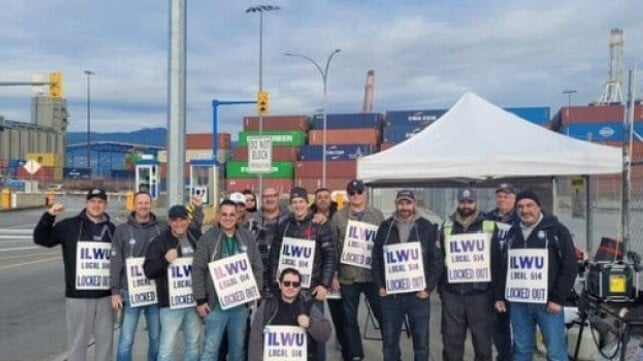Canadian Dock Foremen’s Local Files Court Challenge to Arbitration Order

The union local representing approximately 700 foremen for Canada’s West Coast ports filed a challenge in court to the federal government’s order ending a nearly two-week lockout that paralyzed the Port of Vancouver and other Pacific Coast ports. It is the latest step in a year-long labor contract dispute over the use of automation at the terminals and its impact on jobs and scheduling.
The Canadian Press reported that Local 514 of the International Longshore and Warehouse Union filed its legal challenge on Tuesday, November 19. According to the report, the union alleges the back-to-work order violates the right to collective bargaining and the right to strike. The union contends these rights are protected by Canada’s Charter of Rights and Freedoms.
The federal government’s Labour Minister, Steven MacKinnon, stepped into the dispute on November 12 after more than a week of the lockout on the West Coast and a similar move by the employers’ association locking out 1,200 dockworkers in Montreal. Saying that the impact was spreading to the Canadian citizens and the economy MacKinnon invoked his authority and directed the Canada Industrial Relations Board (CIRB) to order both unions back to work and to start final and binding arbitration in both contract disputes.
CIRB is reportedly scheduled to hear the West Coast labor issues on December 9 and 10. The legal challenge to the authority however runs deeper as the government for example used the same authority to end strikes against the two major railroads in Canada earlier this year. A similar impasse in the prior contract negotiations for longshoremen in Montreal was also ended with government-enforced arbitration.
Local 514 has faced other challenges during the extended negotiation process. CIRB on three occasions cited the local for “bad faith” negotiations saying in October that it ignored automation issues and waited a year to present a proposal for manning to DP World. Previously, the local had called a strike targeted at DP World but CIRB ruled in July it was an illegal strike notice because the local only polled workers at DP World and not all its members.

that matters most
Get the latest maritime news delivered to your inbox daily.
Work resumed at the Port of Vancouver last Thursday, November 14, following the order from the minister and CIRB. The union however had said it intended to challenge the order as did the union for the dockworkers in Montreal.
The Port of Vancouver, which is Canada’s busiest port, has been working to begin to clear the backlog while trade associations warned it would take weeks to fully recover. As of November 20, the Vancouver Fraser Port Authority reports its anchorages remain nearly full. It has 44 vessels at anchor, mostly bulkers, with another 32 vessels at berth. There are six containerships on berth, with one reflecting a 13-day wait to reach the terminal, while another six are in the anchorage. Three containerships have been waiting almost four to more than eight days to reach the berth while three more vessels are holding further offshore. Berth requests from inbound vessels include containerships from HMM, COSCO, OOCL, MSC, and Evergreen, with reports earlier in the week that the authority had requested vessel slow steam to space out arrivals while the efforts to clear the backlog continued.
